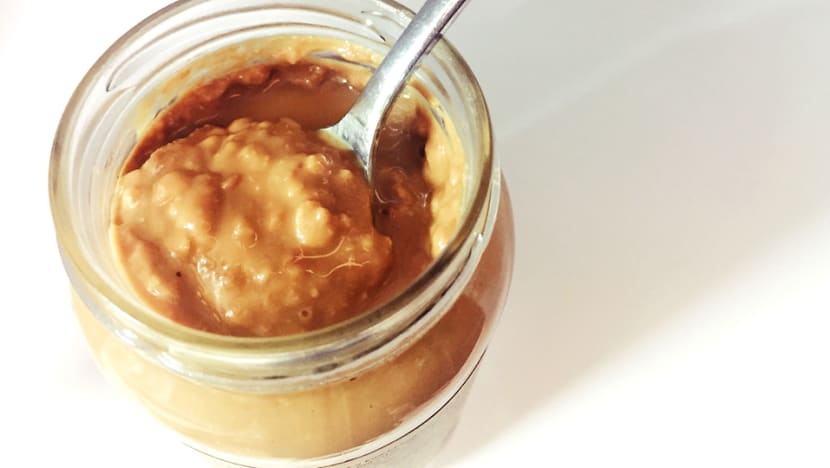'We live on tenterhooks': Parents of children with peanut allergies on how they cope with the condition
Parents tell us they face difficulties dining out and also having to explain the severity of their children's allergic reaction to others. Doctors say awareness of food allergies in Singapore is generally low.

File photo of peanut butter. (Photo: Diane Leow)
SINGAPORE: Mary* has started asking God to “take away” her peanut and dairy allergies. The six-year-old is acutely aware of her allergies, which have made her feel different and out of place at her kindergarten.
“Mary has been told 'if you are at a party, it's not a good party'. It's so sad," Mary's mother told Channel NewsAsia.
She added that parents of Mary's classmates feel their children should have the right to bring their favourite food to the frequent parties held in class because they believe there will be no more parties once their children start primary school next year.
"They (the parents) don't like to have to check labels. Also, they think we infringe on their right to have a good party and eat their favourite food,” said Mary's mother, a 37-year-old management consultant.
She wanted to keep herself and her daughter anonymous as she does not want her daughter to be “ostracised further than she already is”.
Peanut allergies came into the spotlight last week after news that a three-year-old boy on board an Australia-bound Singapore Airlines (SIA) flight had a severe allergic reaction to peanuts.
The toddler had a nut-free meal served to him, but his eyes began to swell and he started vomiting after other passengers opened packets of peanuts which had been served to them as a snack. SIA said it is reviewing the serving of nuts on its flights after the incident.

Mary and her mother have taken SIA flights, but only after an "enormous effort" of three months of preparations, and several back and forth emails. She said that SIA replaced the nut snacks with dried cranberries, and passengers in the three rows in front and behind them were told not to consume nuts if they had brought them along.
Paediatrician at Mount Elizabeth Hospital Dr Chiang Wen Chin said although most children with food allergy typically react to the food when it is eaten, there is a small minority of children who experience reactions to airborne food particles such as peanut, cow's milk, shellfish and fish.
“The exposure can be trivial, as in mere smelling or being in the vicinity of the food. Usually, respiratory manifestations include rhinoconjunctivitis, coughing, wheezing, and asthma, but in some cases even anaphylaxis has been observed,” she said.
Anaphylaxis is a potentially life-threatening reaction to an allergy that can send the body into shock. Breathing may be impaired and blood pressure may drop. It is potentially fatal.
She added that there are individuals who are “exquisitely sensitive” to the peanut protein and very minute quantities may elicit a severe and significant reactions whereas there are individuals who have only have a reaction when they have eaten a larger quantity of peanut.
“The reaction to peanut protein in a individual may be unique and sometime unpredictable,” Dr Chiang said.
LIVING ON “TENTERHOOKS”
In Mary’s case, having two peanut butter cookies proved to be too much. In October last year, despite knowing that Mary has a peanut allergy, her teacher passed her peanut butter cookies in a party pack to take on the school bus, with instructions not to eat the cookies and pass them to her mother.
“She was just five and two months then. Of course she ate it and had an attack. It was a miracle she didn't die,” her mother said.
She experienced runny eyes, runny nose, and a cough. Her face and body started to break out in hives as well. Her parents gave her antihistamines, medicines that are typically used to relieve these symptoms, and took her to a nearby clinic.
“Everyday we put Mary on the school bus and we don't know if she will come back alive. We live on tenterhooks whenever a call from school comes. It's quite stressful,” she said.
Mary is armed with an EpiPen, an epinephrine auto-injector which constricts blood vessels to increase blood pressure, relaxes smooth muscles in the lungs to reduce wheezing and improve breathing and works to reduce hives and swelling that may occur around the face and lips. Her mother has taught the school bus driver how to use it, and drive her to the hospital, if needed.
CROSS-CONTAMINATION A FEAR
Even without consuming peanuts, those who are allergic can get reactions due to cross-contamination.
For example, if a cake slice containing nuts was dropped on the floor and a peanut allergy sufferer touches the area after the cake is removed, and uses his hands without first washing his hands to eat something else, this could trigger a reaction.
This means that even packing food for her daughter everyday will not eliminate the chances of her getting an allergic reaction, Mary’s mother said. However, she does not need to do that as the school serves food that is suitable for her daughter.
The mother of a five-year-old boy who has a severe and potentially fatal allergy to dairy and egg products, who wanted to be known as Yvonne, said that he can react within 15 minutes of cross contaminated food and turn blue, or close to death in less than 30 minutes.
Chief operating officer of restaurant chain Swensen's Andrew Khoo whose two children, aged 11 and 14 have peanut allergies said that cross-contamination is the biggest issue. Once, his daughter had local dish satay without the peanut sauce and started vomiting, because there was some cross-contamination.
Mr Khoo said he always makes sure with the eateries that there is no peanut or peanut oil in the dishes they order for their children.
“If they are not aware, they check with the kitchen. I try to put across that it is a serious issue,” he said. The eateries have been receptive to his checks, he said.
Mary’s mother has had less luck. Many restaurants she has been to serve food and sauces prepared in a kitchen off-site and the cooks may not know the ingredients, said Mary’s mother. Hawker centres are riskiest,she added.
“Many stalls hire foreign workers as cooks and they have no idea what's in the sauce, or pre-prepared food. Also, different stalls have different recipes for the same thing, so we have to check every time,” she said.
AWARENESS ON FOOD ALLERGIES GENERALLY LOW: DOCTORS
Doctors here said that about one in 200 children has a peanut allergy, and that awareness on it is generally low. Mr Khoo knows this first-hand. He has encountered people who are dismissive of his children's food allergies.
“Some think it's a lifestyle choice that we don't give our children certain foods,” he said.
Yvonne faces the same misconception from others.
“It is difficult because many, including professionals and family have difficulty understanding the severity. Most, if not all, think we are over-reacting, over-protective and helicoptering our child,” she said.
She added that they often say that “there's only a very small amount of egg or dairy,” and continue to offer him food with unknown ingredients without informing her.
“While we understand how harmless they are, the act can be devastating - he can die from a low amount of cross contamination,” she said.
Consultant at the division of Paediatric Allergy, Immunology and Rheumatology at the National University Hospital (NUH) Dr Soh Jian Yi said the the biggest danger to those with food allergy is lack of awareness by others around them.
“Many vigilant people with food allergy still react when they are served food that happens to contain the allergen, but no one preparing the food is aware of this, until the person develops an allergic reaction in the restaurant,” he said.
MOST DON’T OUTGROW PEANUT ALLERGY
Peanut allergy typically starts at a young age, and only up to 20 per cent outgrow the sensitivity, doctors said.
“Peanut allergies tend to appear in the preschool years. Children with severe eczema are at higher risk of developing food allergies, including peanut allergy,” Dr Soh said.
People with peanut allergies have to be aware of all the foods they can encounter that can contain peanut, check regularly when they eat out, and carry an emergency kit with them at all times, he added.
While chances of outgrowing the allergy are not high, there is still hope. Dr Soh is head of a treatment programme at NUH that is aimed at helping children with persistent food allergies.
The programme was started in 2015. No medication is involved. Instead, a child is given minuscule amounts of the food allergen, with the dose gradually increased until he can safely stomach small amounts.
Dr Soh said that most of the children are on treatment for peanut allergy. Over 30 have enrolled and participated in the program for peanut allergy, he said, adding that seven have completed it and are eating peanut-containing food, with several more due to complete their treatment .
Some of the 30 children are on treatment for multiple food allergies simultaneously and this includes patients from the region who fly in with their families for this treatment he said.
Dr Chiang said that children with siblings with peanut allergy as well as children with severe eczema should consider early intervention with early weaning on advice of their allergist after food allergy testing.
“There is evidence that earlier safe and supervised introduction of peanut and egg in the weaning diets of these high risk individuals appears to improve their food allergy outcomes as opposed to strict avoidance of these potentially highly allergenic foods. However, caution needs to be given to these families as significant reactions can occur,” she said.
*Names have been changed to protect identities.














